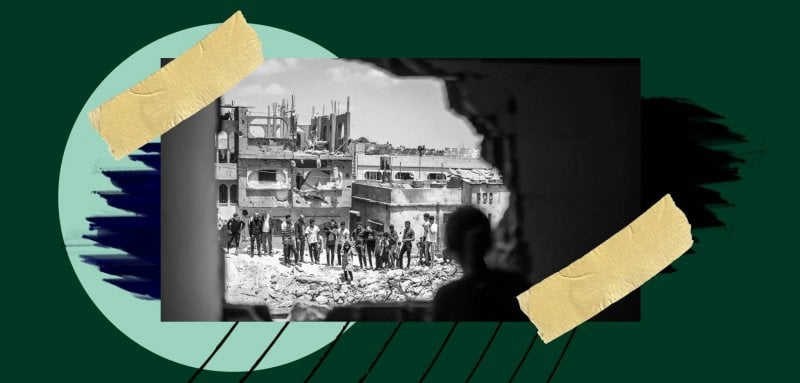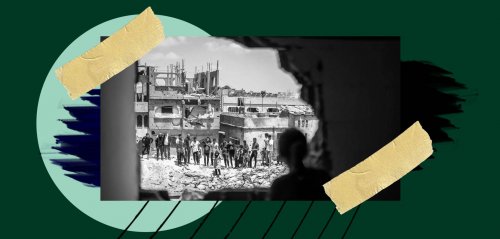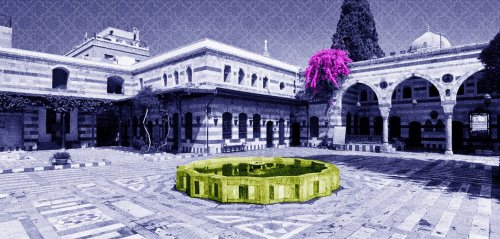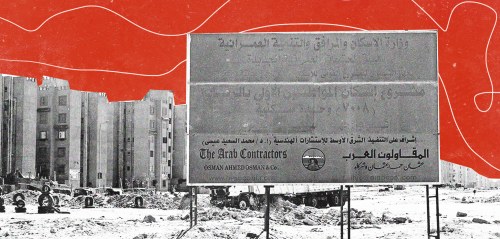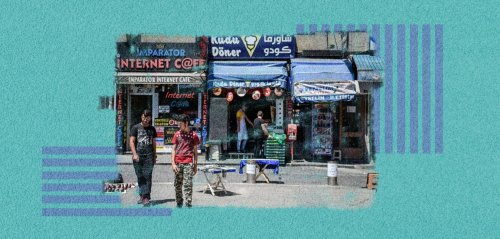After the Naksa, my family became holders of an identity card with a small break between two of the numbers on it, one of the achievements of nationalism in our country. This is my story: a Syrian man, who left the Golan, realizing that he is a ‘displaced person’, and that it isn't a deficiency or flaw as some political factions wanted it to be.
At the checkpoint, that soldier always stopped me to ask about that break on my ID, especially after the major events that took place in the south in 2011. I would explain to him the history of the Naksa, just as if I were explaining to my students during our lesson on Arab nationalism, but with some caution. I would describe how the displaced, a diaspora, formed settlements in poor neighborhoods south of the capital and throughout the disarmed region in the south of Syria. Only then would he realize that I am from there, from that broken generation. His face would soften, and then harden in bewilderment, as if I were the cause of all those Arab defeats. “You're displaced?” he would ask me.
I would answer him in my customary tone, “Yes, expelled.” And he would jokingly observe, “And you're happy?” before patting me on the shoulder, laughing, and I smile at the asphalt in front of him before moving on.
When the recent war expelled many Syrians from their homes, the word ‘displaced’ took on a different meaning. It became a term that many shared equally, like all the teeth in a comb. Every week, my home, like everyone else’s in the Golan, would open its doors to displaced people from across Syria’s provinces. That was when the national Naksa equated our national disappointments, or so I thought, anyway.
But at a refugee camp in a remote village in southern Germany, no one forgot to refer to me by my assigned name, instead of my family name. If a request for work came up, I would hear, “Bring us the displaced man.” If someone wanted a volunteer, they would shout loudly, “Give the displaced man a broom.” If they sought a translator, they would say, “Perhaps the displaced man can help us.” Even more, my room became a landmark of sorts. I once overheard someone asking where the barber is, and he was told matter-of-factly, “You'll find him after the bathroom, near the displaced man's room.”
In a refugee camp in a remote village in Germany, no one forgot to refer to me by my assigned name. If they needed a volunteer, I would hear, “Give the displaced man a broom”. If a translator was needed, they'd say, "Perhaps the displaced man can help us"
In this way, this man is still harshly described, in those slums south of Damascus and on its outskirts, and near the southwestern border of the country, as a hard-hearted person– a man who does not know the Quran, whose eyes tremble and lose focus whenever he spots a stranger in his neighborhood. This man speaks two dialects and works two professions, and since the most recent war, he has become a “displaced person” twice. This is how he got used to death, more than once, within the borders of his beautiful homeland.
Twice expelled
Yesterday, in an isolated German neighborhood, I met a man from the diaspora neighborhoods south of Damascus. From his trembling gait and tense shoulders, I knew he belonged to our defeated generation. A stranger like me, broken and in pain, shaking from having traveled so much. When we met, he had escaped from those forsaken settlements, and embarked on building a new life here in Germany. He seemed to have endured harsh days in solitude, embodying the phrase shared by grandmothers during the Naksa, “He danced without a drum.”
My imagination ran wild after he began telling me and yearning for all that he left behind in his neighborhood. He spoke passionately about his cherished past there, wondering, how he could be there once again?
Every time he spoke to me, he would conclude his sentence with a kind phrase – one with a deeper meaning, “Do you understand, uncle?” One word sometimes grants us the identity we want without effort. The term ‘uncle’, used by the displaced and expelled people of south Damascus in neighborhoods like Sbeineh, Yarmouk Camp, al-Tadamon, Al Hajar Al Aswad (the black stone), and other makeshift settlements and slums, tells us about the depth of the degraded emotions we possess. Indeed, one's relationship with his uncle strengthens after he loses his father. This is why the relationship with the uncle has become sacred, representing an intimate bond that reflects loss, orphanhood, and displacement, and a search for some kind of reunification. This is why they repeat the poignant phrase, “Only the word 'uncle' properly fills the mouth.”
Before leaving this stranger, he placed his hands heavily in mine, fixed his eyes onto my face, and I noticed the bruises on his face which transported me to days long gone, the days of our childhood in those Syrian towns.
The first and second-generation residents speak the peasant and Bedouin dialect, while the third-generation blends their parents' dialect with the common Damascene dialect and even with the dialect of their Palestinian refugee neighbors.
One neighborhood like all others
The old building in which I lived in that Syrian neighborhood belonged to a cranky middle-aged woman, with a tough, harsh face, sort of like that of Nicolas Cage in the movie The Unbearable Weight of Massive Talent. Comparing my Syrian landlord to my new landlord, in this faraway neighborhood in southern Germany, evokes Nicolas Cage and his two faces in Face/Off. As for my Syrian landlord’s husband, he was a good man, referred to by residents of the neighborhood as ‘the sweet man’. I was always curious, until one day I finally asked him, “Why is your face always looking like a punching bag, filled with scars and cracks?” He replied, “Women love it, brother. There's no dignity if we don't defend our rights.” But I couldn't bring myself to ask him if his wife's cranky face required all this trouble.
This was, and still is, the rule of the neighborhood. The men of the neglected Syrian and Palestinian settlements on the outskirts of Damascus are like the spotted hyenas of the Pleistocene era; they annihilate each other to keep their dignity.
Many slums and makeshift neighborhoods have emerged in southern Damascus, and this one is among those. One old neighborhood, torn from Fernando Meirelles in his epic crime film City of God. Administratively, this neighborhood is called Sbeineh, or as its residents jokingly refer to it, the ‘start-up’ or ‘rookie Spain’.
The neighborhood was built in the mid-20th century using irresponsible cement structures. Factories looted the edges of the neighborhood at the expense of farmland. Houses were built haphazardly around one another, sort of resembling a game of tic-tac-toe, and from above, like a mess of entangled churros.
The factories and chaos created a great dump that residents refer to as Al-Rabbish, and I do not know the meaning of that name, except that it means “things that can be dispensed with.” Here, everything can be dispensed with. Even when the last war broke out, many humans were dispensed with, after nearby neighborhoods, including Yarmouk Camp, al-Tadamon and Al Hajar Al Aswad fell under siege and an unfamiliar state prevailed.
Over time, and due to the overt, administrative corruption, Al-Rabbish became a place where the small proletariat would earn a living, collecting scrap, cardboard, raising goats, and, most importantly, a meeting place for lovers and those seeking to hide from the authorities.
For years, the neighborhood was a refuge for refugees and the displaced– a refuge for those fleeing from the Golan and Palestine during the most bitter years in the nation's history (1948 and 1967). During those years, generations mixed together, forming an autonomous and unregulated canton near the capital, reminiscent of those that emerged after the Helvetic Revolution in Switzerland at the close of the 18th century.
Since every social component is corrupted, the neighborhood was ultimately divided into two parts in order to put an end to continuous feuding and organize labor and businesses. ‘The Camp’ included the Palestinian people, and ‘Sbeineh Al-Kubra’ (or, the Larger Sbeineh), included families from the Golan tribes and clans. Clans in these urban neighborhoods take on mafia-like structures – though not in a derogatory sense. Like the tribes of the Iberians and the Vancouver wolf, each over time adheres to its borders and areas of influence, forming parallel societies that resolve disputes under the local justice system run by the neighborhood tough guys, who over time, form a sacred totemic state deserving of and requiring respect and acceptance.
When entering the neighborhood for the first time, one should seek refuge with a tribe or one of its 'tough guys'. As in every alley, there are two young men voluntarily guarding its entrances. Therefore, it is rare to find anyone (man or woman) not carrying a knife, usually of the "Krondari" type, in their pocket. This situation has become part of daily routines, as every individual here finds himself the guardian of his group because a person's group here is their honor. It's rare to enter one of the alleys twice without being questioned, and often harmed. It is not desirable to walk the same path twice, an ancient Bedouin rule that has been passed down in the neighborhood, from one generation to the next.
In this neighborhood, resorting to the police to settle disputes is considered the way of the weak. The central authority in Damascus agreed, provided that no trouble or disturbance is caused. Any police officer who wishes to practice his profession in the neighborhood must bear the consequences of being a ‘good guy’ in a neighborhood of tough guys.
The Middle East is the only region in the world that has been engaged in war continuously since World War II. With the beginning of the new millennium, these neighborhoods have grown remarkably, as if it's a new round of war expanding to consume major cities
The neighborhood's young men are similar, with their charismatic features, curly hair, pointed noses, and Mediterranean tans. They also wear pants with many pockets, wrap a keffiyeh around their necks, a style of the local culture that has prevailed over time.
Residents there have two dialects and two accents. The first and second-generation parents speak the peasant and Bedouin dialect, while the third-generation children blend their parents' dialect with the average Damascene dialect and even with the dialect of Palestinian refugees in the neighborhood. They have formed a unique dialect where certain letters are pronounced over others.
A large neighborhood swallowed a nation
The Middle East is the only region in the world that has been engaged in continuous wars since World War II. Since the start of the new millennium, these neighborhoods have grown remarkably. It is as though new rounds of war expand to consume major cities, until the Middle East, from ‘Afghanistan 2001’ to ‘Lebanon and Syria 2011’, turns into a giant slum neighborhood exporting chaos and expelled people worldwide. A great informal settlement managed by tough guys and tribes wearing keffiyehs, flaunting their scars to women. Each neighborhood here has sought to eliminate the other, as at war, the ‘war to end all wars’, and for this reason, streets have been filled with innocent blood trickling from the blades of knives, hatchets, machetes, sickles, and chains.
* The views and opinions expressed in this article are those of the author’s and do not necessarily reflect the official policy or position of Raseef22
Raseef22 is a not for profit entity. Our focus is on quality journalism. Every contribution to the NasRaseef membership goes directly towards journalism production. We stand independent, not accepting corporate sponsorships, sponsored content or political funding.
Support our mission to keep Raseef22 available to all readers by clicking here!
Interested in writing with us? Check our pitch process here!
